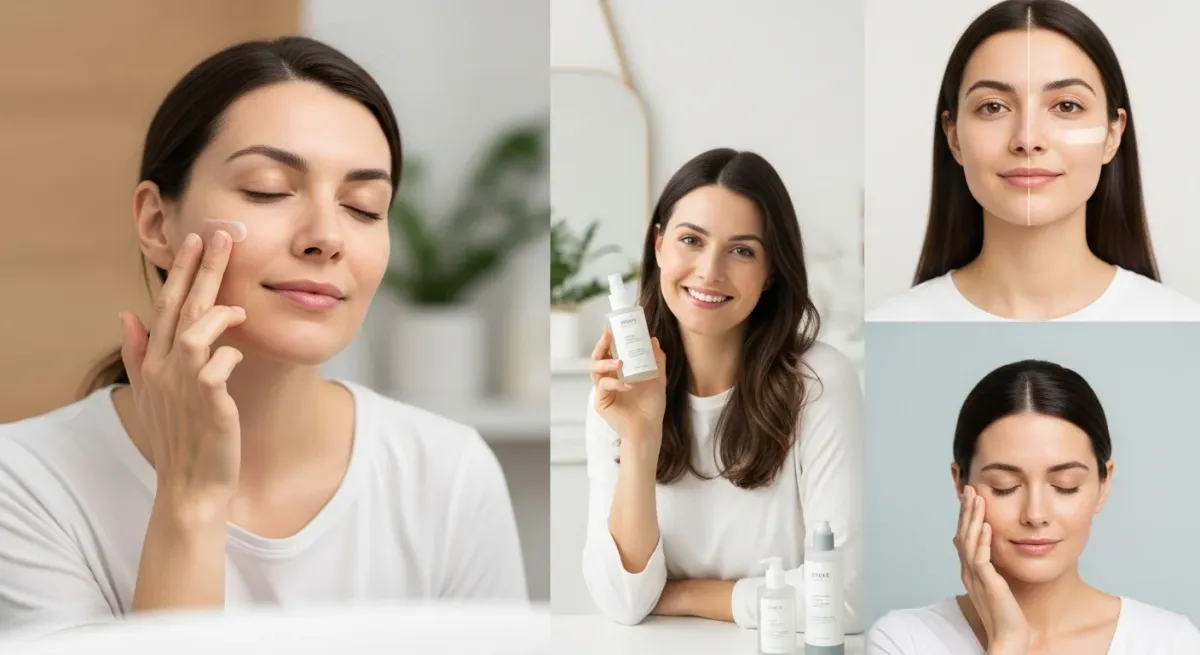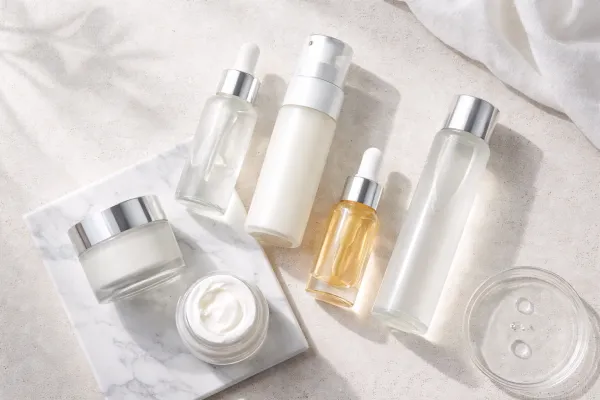The Ultimate Skincare Routine for Sensitive Skin: Tips for a Gentle Glow
Discover the ultimate skincare routine for sensitive skin, featuring gentle tips for a radiant glow!

Creating a skincare routine for sensitive skin can be tricky, but it doesn't have to be!
This guide will help you understand sensitive skin better and provide you with easy tips to achieve a healthy, glowing complexion.
From choosing the right products to incorporating gentle techniques, you'll find everything you need to care for your skin without irritation.
Key Takeaways
- Identify what makes your skin sensitive and avoid those triggers.
- Use gentle cleansers and moisturizers designed for sensitive skin.
- Always apply sunscreen to protect your skin from harmful rays.
- Exfoliate carefully and not too often to avoid irritation.
- Stay hydrated and eat foods that support skin health.
Understanding Sensitive Skin
Sensitive skin can feel like a rollercoaster ride, right?
It’s not just a skin type; it’s a whole condition!
Our skin reacts strongly to things that wouldn’t bother most people. This happens because our skin barrier, which is like a protective shield, is weaker and more prone to irritation.
When this barrier is compromised, irritants can sneak in, causing redness, dryness, and that annoying stinging sensation.
What Makes Skin Sensitive?
So, what actually makes our skin sensitive? Well, it often comes down to a few key factors:
- Weak skin barrier: This means our skin can’t keep irritants out as well.
- Environmental triggers: Things like weather changes, pollution, or even certain fabrics can set off reactions.
- Product ingredients: Some ingredients, especially harsh ones, can cause our skin to react badly.
Common Triggers for Sensitive Skin
Here are some common culprits that can trigger sensitive skin:
- Fragrances: These can be sneaky irritants.
- Harsh chemicals: Ingredients like alcohol can dry out our skin.
- Extreme temperatures: Both hot and cold can cause flare-ups.
How to Identify Sensitive Skin
Identifying sensitive skin can be tricky, but here are some signs to look out for:
- Redness: If your skin often looks flushed.
- Itching or burning: These sensations can be a big clue.
- Dry patches: If your skin feels rough or flaky, it might be sensitive.
Remember, if you’re unsure, it’s always a good idea to check in with a dermatologist. They can help us figure out what’s going on with our skin and how to treat it best!
Choosing the Right Cleanser
When it comes to keeping our sensitive skin happy, choosing the right cleanser is super important. We want something that cleans without causing irritation. Here are some tips to help us pick the best one:
Ingredients to Look For
- Look for gentle, hydrating ingredients like glycerin and aloe vera.
- Cleansers with micellar water can be great for lifting dirt without scrubbing too hard.
- Products labeled as hypoallergenic are usually safer bets.
Ingredients to Avoid
- Stay away from harsh sulfates that can strip our skin.
- Fragrances and alcohol can cause irritation, so it’s best to skip those.
- Avoid any cleansers with strong acids unless recommended by a dermatologist.
How Often Should You Cleanse?
- We should aim to cleanse our face twice a day—once in the morning and once at night.
- If we’ve been sweating or wearing makeup, a double cleanse can help remove all the grime.
- Remember, over-cleansing can lead to dryness, so listen to our skin!
Keeping our skin clean is key to preventing breakouts and irritation. Let’s find a cleanser that works for us!
In our search for the best face washes, we might come across some top picks like Dr. Loretta Gentle Hydrating Cleanser and Cetaphil Gentle Skin Cleanser. These are often recommended for sensitive skin types, making them great options to consider!
Moisturizing for Sensitive Skin

When it comes to keeping our sensitive skin happy, moisturizing is key. It’s like giving our skin a big, cozy hug! Here’s how we can do it right:
Best Moisturizers for Sensitive Skin
- Look for products that are fragrance-free and hypoallergenic.
- Ingredients like shea butter, coconut oil, and hyaluronic acid are fantastic for hydration.
- Avoid anything with alcohol or harsh chemicals that can irritate our skin.
How to Apply Moisturizer
- Start with clean skin. Gently pat it dry.
- Take a small amount of moisturizer and warm it up between your fingers.
- Apply it in a circular motion, focusing on dry areas.
DIY Moisturizer Recipes
- Simple Coconut Cream: Mix coconut oil with a few drops of lavender oil for a soothing effect.
- Aloe Vera Gel: Just use pure aloe vera gel for a refreshing, hydrating boost.
- Honey and Olive Oil: Combine equal parts for a nourishing treat.
Remember, moisturizing isn’t just about slapping on cream; it’s about finding what works for our skin and keeping it hydrated and happy!
Sun Protection Tips
Why Sunscreen is Essential
We all know that sunscreen is a must for everyone, especially for those of us with sensitive skin. It helps protect our skin from harmful UV rays that can cause damage and irritation. Without it, our skin can become red and inflamed, which is the last thing we want!
Choosing the Right SPF
When picking a sunscreen, we should look for a broad-spectrum option with an SPF of at least 30. This means it protects against both UVA and UVB rays. Here’s a quick table to help us remember:
SPF Level | Protection Duration | Skin Type |
|---|---|---|
15 | 150 minutes | Fair |
30 | 300 minutes | Medium |
50 | 500 minutes | Dark |
How to Apply Sunscreen Properly
Applying sunscreen correctly is just as important as choosing the right one. Here’s how we can do it:
- Apply generously: Use about a shot glass full for your whole body.
- Don’t forget spots: Make sure to cover areas like ears, neck, and the tops of our feet.
- Reapply often: We should reapply every two hours, or more often if we’re swimming or sweating.
Remember, protecting our skin from the sun is one of the best things we can do for our skin health. Let’s make it a habit!
Exfoliating Gently
Why Exfoliation is Important
Exfoliating is a key part of our skincare routine, especially for sensitive skin. It helps remove dead skin cells, making our skin look fresh and glowy. But we need to be careful! Gentle exfoliation is crucial to avoid irritation.
Best Exfoliators for Sensitive Skin
When it comes to choosing exfoliators, we should look for products that are mild and effective. Here are some great options:
- Chemical exfoliators: These use acids like AHA or BHA to gently slough off dead skin without scrubbing.
- Enzyme exfoliators: These are derived from fruits and are super gentle on our skin.
- Manual exfoliators: If we prefer scrubs, we should choose ones with fine particles, like the Sespring So Polished Sugar Scrub, which hydrates and nourishes our skin.
How Often to Exfoliate
For sensitive skin, we should limit exfoliation to 1-2 times a week. This helps maintain our skin barrier while still keeping our skin looking fresh. Over-exfoliating can lead to redness and irritation, so let’s keep it light!
Remember, our skin is delicate. Taking care of it means being gentle and listening to what it needs. If we notice any irritation, it’s best to take a break and let our skin recover.
By following these tips, we can enjoy the benefits of exfoliation without compromising our skin's health!
Hydrating from Within

Importance of Hydration
Staying hydrated is super important for our skin! When we drink enough water, our skin looks plump and healthy. It helps maintain our skin's moisture barrier, which is crucial for sensitive skin.
Best Drinks for Skin Health
Here are some drinks that can really help our skin:
- Water: The best and simplest choice!
- Coconut Water: Hydrating and packed with electrolytes.
- Herbal Teas: Great for hydration and soothing.
Foods That Hydrate Your Skin
Eating the right foods can also boost our skin's hydration. Check out this list:
- Cucumbers: They are mostly water and super refreshing.
- Watermelon: Delicious and hydrating!
- Oranges: Full of vitamin C and water.
Remember, hydration starts from the inside out! Keeping our bodies hydrated can make a big difference in how our skin looks and feels.
So, let’s make sure we’re drinking enough and eating hydrating foods to keep our skin glowing!
Nighttime Skincare Routine

When it comes to our nighttime skincare routine, we want to keep it simple yet effective. A good routine can make all the difference! Here’s how we can pamper our sensitive skin before bed:
Steps for a Nighttime Routine
- Cleanse: Start with a gentle cleanser to wash away the day’s dirt and makeup. Look for something that’s non-irritating and hydrating.
- Treat: If we’re using any treatments like retinoids, now’s the time. Just remember to apply a thin layer and let it absorb.
- Moisturize: Lock in hydration with a soothing moisturizer. This helps to repair our skin barrier overnight.
Best Night Creams for Sensitive Skin
Product Name | Key Ingredients | Price |
|---|---|---|
Dermalogica Overnight Retinol Repair | Peptides, Vitamin C | $92 |
Dr. Whitney Bowe Glow Cream | Squalane, Ceramides | $95 |
La Roche-Posay Toleriane Double Repair | Niacinamide, Ceramides | $24 |
Tips for a Restful Sleep
- Create a calming environment: Dim the lights and keep the room cool.
- Use a silk pillowcase: It’s gentler on our skin and helps reduce irritation.
- Stay hydrated: Drink water before bed, but not too much to avoid waking up!
Remember, a consistent routine is key to achieving that gentle glow we all want. Let’s take care of our skin while we sleep!
Dealing with Redness and Irritation
Common Causes of Redness
Dealing with redness can be a real pain, right? We often find that our skin reacts to various things, and it’s important to know what’s causing it. Here are some common culprits:
- Harsh ingredients in skincare products
- Environmental factors like pollution and weather changes
- Stress and lack of sleep
Soothing Ingredients to Look For
When our skin feels irritated, we need to calm it down. Look for products that contain soothing ingredients. Some of our favorites include:
- Aloe vera
- Chamomile
- Vitamin E
When to See a Dermatologist
If we notice persistent redness or irritation, it might be time to consult a dermatologist. Here are some signs that we shouldn’t ignore:
- Redness that doesn’t go away
- Swelling or pain
- New rashes or changes in skin texture
Remember, our skin is delicate and deserves gentle care. Taking a break from harsh products can help restore balance.
By understanding what triggers our skin and how to soothe it, we can keep that gentle glow we all want!
Makeup Tips for Sensitive Skin
Choosing the Right Foundation
When it comes to foundation, we want to keep it light and breathable. Opt for mineral-based foundations that are free from harsh chemicals. These are less likely to irritate our sensitive skin. Here are some tips:
- Look for products labeled as hypoallergenic.
- Avoid foundations with fragrances or alcohol.
- Test a small amount on your wrist before applying it to your face.
Makeup Removal Tips
Removing makeup gently is key for us. We should always use a soft makeup remover that’s designed for sensitive skin. Here’s how we can do it:
- Soak a cotton pad with the remover.
- Hold it over our eyes for a few seconds to dissolve the makeup.
- Wipe away gently without rubbing.
Best Makeup Brands for Sensitive Skin
Not all makeup is created equal, especially for sensitive skin. Here are some brands we can trust:
- BareMinerals: Great for mineral makeup.
- Clinique: Known for its allergy-tested products.
- Tarte Cosmetics: Offers vegan and cruelty-free options.
Remember, our skin deserves the best care. Always listen to it and adjust our routine as needed!
Lifestyle Tips for Healthy Skin
Managing Stress for Better Skin
We all know that stress can mess with our skin. Taking time to relax is key! Here are some ways we can manage stress:
- Meditation: Just a few minutes a day can help clear our minds.
- Deep Breathing: Simple but effective; it calms our nerves.
- Hobbies: Engaging in activities we love can be a great escape.
The Role of Diet in Skin Health
What we eat really matters! Foods rich in vitamins and minerals can help our skin glow. Here’s a quick list of skin-friendly foods:
- Nuts and Seeds: Great for collagen production, thanks to copper.
- Legumes: Packed with lysine, which is essential for skin repair.
- Fruits and Veggies: They provide antioxidants that fight skin damage.
Exercise and Skin Benefits
Staying active is not just good for our bodies; it’s great for our skin too! Here’s how:
- Increased Blood Flow: Helps deliver nutrients to our skin.
- Sweating: Cleans out our pores and removes toxins.
- Boosts Mood: A happy mind leads to happy skin!
Remember, taking care of our skin is a journey, not a race. Let’s enjoy the process together!
Patch Testing New Products

Why Patch Testing is Important
When we think about trying out new skincare products, it’s super important to remember the vital role of patch testing. By conducting a patch test, we can assess how our skin reacts before trying out a new serum, cream, or oil.
This way, we can ensure the safety of our skin and avoid any nasty surprises later on.
How to Patch Test
Here’s a simple way to do a patch test:
- Choose a small area: Pick a spot on your arm or behind your ear.
- Apply a small amount: Use a pea-sized amount of the product.
- Wait 24-48 hours: Keep an eye on the area for any reactions.
If you notice any redness, itching, or irritation, it’s best to avoid using that product on your face.
Interpreting Patch Test Results
After waiting, check the area:
- No reaction: You’re good to go!
- Mild redness: It might be okay, but proceed with caution.
- Severe reaction: Definitely avoid that product.
Remember, if you are sensitive to some products but not others, you may be able to avoid future skin reactions by doing a patch test on a small area of skin before you apply it more widely.
Patch testing is a simple step that can save us from a lot of trouble down the line!
Wrapping It Up: Your Path to Radiant Skin
So there you have it!
Taking care of sensitive skin doesn't have to be a hassle. With the right routine, you can keep your skin happy and glowing.
Remember to be gentle, stick to products that soothe, and always listen to your skin's needs. If something feels off, don’t hesitate to simplify your routine.
With a little patience and care, you’ll be on your way to showing off that beautiful, healthy glow. Cheers to happy skin!
Frequently Asked Questions
What is sensitive skin?
Sensitive skin is skin that reacts easily to different things like products, weather, and even stress. It can feel itchy, red, or tight. Fragrances and other potential allergens can irritate and further compromise a damaged skin barrier, especially in those with sensitive skin or conditions like eczema and rosacea. Fragrance-free and hypoallergenic products minimize the risk of irritation, allowing the skin to focus on repair. All skin types, from oily to dry, can suffer from barrier damage. Sensitive skin can react to products it previously tolerated well.
How can I tell if my skin is sensitive?
You might have sensitive skin if you notice redness, burning, or stinging after using certain products or after being outside. When your skin barrier is compromised, you may experience: Dryness and flakiness, Sensitivity to products or environmental factors, Increased redness or irritation, More frequent breakouts or infections. These are clear signs that your protective barrier becomes less effective, leaving your skin vulnerable to damage and unpleasant conditions. Signs of an imbalanced skin pH include: Excessive dryness or flaking, Redness and irritation, Increased sensitivity, Breakouts or acne, Tightness or discomfort after cleansing.
What ingredients should I avoid in skincare products?
Stay away from products with alcohol, fragrances, and harsh chemicals, as these can irritate sensitive skin. Fragrances and other potential allergens can irritate and further compromise a damaged skin barrier, especially in those with sensitive skin or conditions like eczema and rosacea. Fragrance-free and hypoallergenic products minimize the risk of irritation, allowing the skin to focus on repair. Teens with sensitive skin should avoid harsh ingredients like retinol, exfoliating acids, abrasive physical exfoliants, fragrances, and alcohol. These can cause irritation, redness, and breakouts. If you have sensitive skin, use mild, "fragrance free" products, as products containing fragrances can leave skin feeling irritated and dry.
How often should I cleanse my sensitive skin?
It's best to cleanse your skin once a day to keep it clean without stripping away its natural oils. Generally, cleansing once or twice a day is sufficient. Over-cleansing can strip your skin of its natural oils, leading to dryness and irritation. Use a gentle, oil-free cleanser. Because regular bar soap often contains harsh ingredients that can be drying to the skin, wash your face with a mild facial cleanser and lukewarm — not hot — water. Avoid harsh cleansers and over-exfoliation. Gentle cleansers are ideal for daily use, especially for dry or sensitive skin, as they protect the skin's natural barrier.
Can I use makeup if I have sensitive skin?
Yes, but choose makeup that is labeled as hypoallergenic and free from fragrances to reduce the risk of irritation. It's best to avoid makeup until your barrier is healed, as it can further irritate the skin. However, if you must wear makeup, choose non-comedogenic, fragrance-free products and ensure thorough but gentle cleansing afterward. Because many beauty products contain preservatives, chemicals or fragrances that could irritate or dry out your skin, it's a good idea to introduce new products one at a time. If you have sensitive skin, use mild, "fragrance free" products, as products containing fragrances can leave skin feeling irritated and dry. Fragrances and other potential allergens can irritate and further compromise a damaged skin barrier, especially in those with sensitive skin or conditions like eczema and rosacea.
What are the best moisturizers for sensitive skin?
Look for moisturizers that are fragrance-free and contain soothing ingredients like aloe vera or shea butter. Fragrances and other potential allergens can irritate and further compromise a damaged skin barrier, especially in those with sensitive skin or conditions like eczema and rosacea. Fragrance-free and hypoallergenic products minimize the risk of irritation, allowing the skin to focus on repair. Barrier repair moisturizers are beneficial for a wide range of skin conditions, including: Eczema (Atopic Dermatitis), Psoriasis, Dry Skin (Xerosis), Contact Dermatitis, Rosacea, Sensitive Skin, Keratosis Pilaris. These conditions are often associated with a compromised skin barrier. Barrier repair moisturizers help restore the barrier's function, reducing symptoms and improving overall skin health.
Is sunscreen necessary for sensitive skin?
Yes, using sunscreen is very important to protect your skin from sun damage, especially if it's sensitive. Dermatologists recommend physical sunscreens, also called mineral sunscreens, for people with sensitive skin. Physical sunscreens contain ingredients like zinc oxide and titanium dioxide that sit on top of the skin and physically block or reflect UV rays. They are often preferred for sensitive skin. You should apply sunscreen every day on skin not covered by clothing if you will be outside. The sun emits harmful UV rays year-round. Even on cloudy days, up to 80% of the sun's harmful UV rays can penetrate the clouds. Dermatologists recommend using a sunscreen with an SPF of at least 30, which blocks 97% of the sun's UVB rays. Higher-number SPFs block slightly more of the sun's UVB rays, but no sunscreen can block 100% of the sun's UVB rays.
What should I do if my skin reacts badly to a product?
If your skin gets red or irritated after using a product, stop using it immediately and consult a dermatologist if it doesn't improve. For mild cases, you can repair a compromised barrier with gentle products and good habits. However, if you experience: Persistent skin sensitivity, Repeated skin infections, Chronic conditions like dermatitis, ...it's time to see a dermatologist. They can tailor treatments to your skin's needs. Dermatologists are essential for diagnosing and treating conditions related to a compromised skin barrier. Consulting a dermatologist ensures you're not just guessing about your skin's needs. If you're experiencing severe or persistent skin issues, it's best to consult a dermatologist for personalized advice and treatment. New spots or moles that itch, bleed, or change color are often early warning signs of skin cancer. If you notice any suspicious spots, make an appointment to see a dermatologist. Dermatologists are skin cancer experts.




